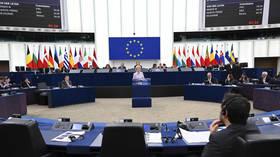EU set to freeze assets of RT's parent company – media

The EU’s upcoming ninth sanctions package will likely strike at Russian media channels – including RT – that have been accused of posing “a threat to the Union’s public order and security,” the EU Observer reported on Monday, citing draft documents.
According to the outlet, lawmakers are looking to freeze all of the EU assets of ANO TV-Novosti, RT’s parent company, which they accuse of “gravely distorting and manipulating facts.” The next package would also place personal sanctions on some 200 individuals and companies and revoke broadcast licenses for three Russian channels – NTV/NTV Mir, Rossiya 1, and REN TV – who have also been accused of trying to “destabilize EU countries.”
The move comes as Russian media channels, including RT and its German-language division RT DE, have come under fire from Western officials and media outlets for disseminating what they call “propaganda” and “Kremlin talking points.”
RT, Sputnik, and most other major Russian news outlets have been banned from broadcasting in the EU since Moscow launched its special military operation in Ukraine in late February. However, a study conducted by the German editorial network (RND) found that many European citizens have been bypassing the bans and continue to read and watch the channels through Telegram, YouTube, and other resources.
Earlier this month, the Insider reported that a CeMAS poll found nearly 44% of Germans supported the notion that “Putin was fighting against the global elite, which secretly controls the world.” The outlet also found a vast network of German-language Telegram channels sharing pro-Russian content.
EU officials are now calling for more decisive measures to censor Russian content within the bloc. Deputy leader of the Union Parliamentary group Andrea Lindholz has suggested creating a special reporting commission to collect and examine examples of “Russian disinformation.”
“Now that everything is becoming more expensive, there is a risk that people will become more receptive to pro-Russian fake news,” she explained.
Meanwhile, General Secretary of the European Federation of Journalists Ricardo Gutierrez has blasted the EU for censoring Sputnik and RT without going through state media regulators. In an interview with France 24 last week, he warned that such an approach threatened freedom of the press in Europe.
“The rules are very clear in this area: If these television channels violate the broadcasting rules, by inciting hatred for example, then yes, they must be banned. But it is not enough to say that they are propagandists,” Gutierrez pointed out.














